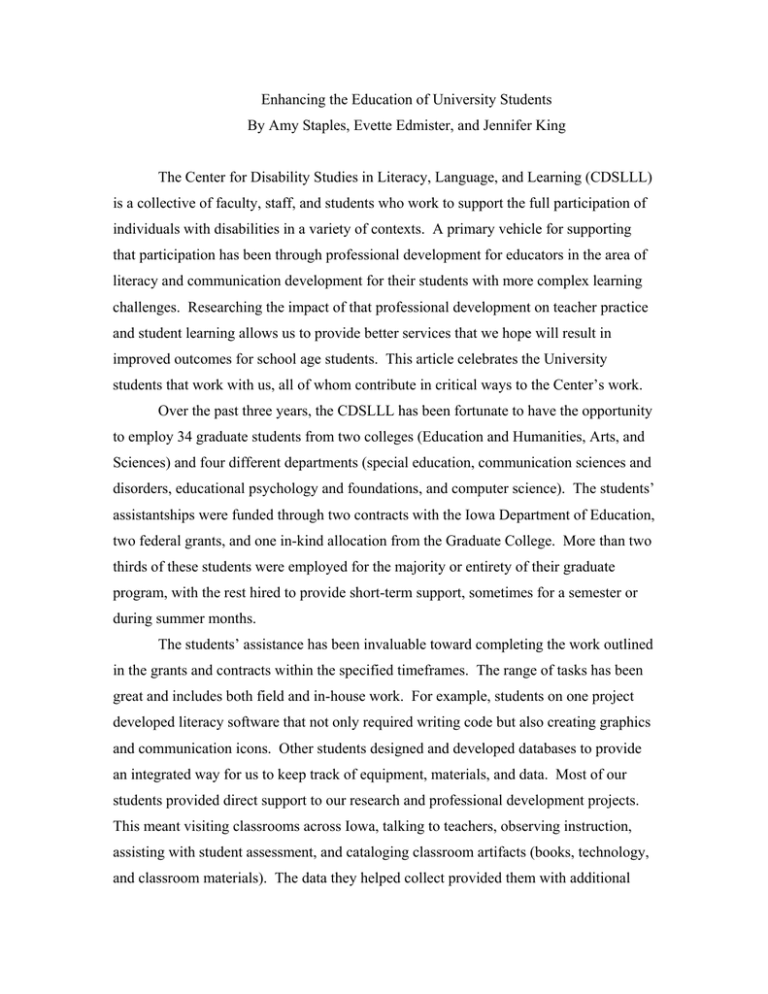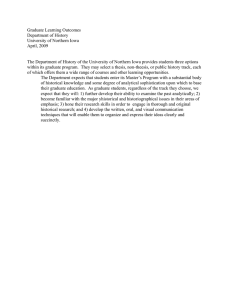Enhancing the Education of University Students
advertisement

Enhancing the Education of University Students By Amy Staples, Evette Edmister, and Jennifer King The Center for Disability Studies in Literacy, Language, and Learning (CDSLLL) is a collective of faculty, staff, and students who work to support the full participation of individuals with disabilities in a variety of contexts. A primary vehicle for supporting that participation has been through professional development for educators in the area of literacy and communication development for their students with more complex learning challenges. Researching the impact of that professional development on teacher practice and student learning allows us to provide better services that we hope will result in improved outcomes for school age students. This article celebrates the University students that work with us, all of whom contribute in critical ways to the Center’s work. Over the past three years, the CDSLLL has been fortunate to have the opportunity to employ 34 graduate students from two colleges (Education and Humanities, Arts, and Sciences) and four different departments (special education, communication sciences and disorders, educational psychology and foundations, and computer science). The students’ assistantships were funded through two contracts with the Iowa Department of Education, two federal grants, and one in-kind allocation from the Graduate College. More than two thirds of these students were employed for the majority or entirety of their graduate program, with the rest hired to provide short-term support, sometimes for a semester or during summer months. The students’ assistance has been invaluable toward completing the work outlined in the grants and contracts within the specified timeframes. The range of tasks has been great and includes both field and in-house work. For example, students on one project developed literacy software that not only required writing code but also creating graphics and communication icons. Other students designed and developed databases to provide an integrated way for us to keep track of equipment, materials, and data. Most of our students provided direct support to our research and professional development projects. This meant visiting classrooms across Iowa, talking to teachers, observing instruction, assisting with student assessment, and cataloging classroom artifacts (books, technology, and classroom materials). The data they helped collect provided them with additional opportunities to prepare data for analysis. This has meant transcribing audiotaped interviews or videotaped instruction, coding transcripts for language analysis, creating summary sheets of student literacy assessments, and entering data into a statistical software program. Graduate students were budgeted in grant proposals to support project needs, but also to provide students with research experience and financial support. Engaging in ongoing, collaborative work with students is rewarding, both for faculty and the students, in ways that far surpass the ones just cited. As we have talked with students during the last three years, and more recently as we prepared this paper, it has become clear that for them, the experience has been much more than a paycheck and formal education. For them, the experience has taught them about research, lessened the financial burdens associated with getting an education, provided them with ongoing field experiences where they could learn more about the professions in which they soon would find employment, supported their own coursework and research, offered them the chance to work closely with faculty in a more collegial fashion, be part of a collaborative multidisciplinary learning environment, and resulted in the establishment of friendships with peers, staff and faculty. When a student is actively engaged in research with a professor, they experience the research cycle. They see how to conceptualize a study, establish location sites, secure IRB approval, determine and organize data for collection and analysis, carry out the study, and process and analyze the data. The idea of research becomes real. They become excited about the research findings as well and actively participate in the construction of dissemination materials, be that manuscripts, reports, or conference presentations. A number of our students have co-presented research at local and national conferences. This sort of active involvement helps them brainstorm ideas for their own research. As they think and develop their research questions, they feel free to discuss their ideas with the Center faculty. They are able to move past their Center tasks and explore their own interests. As mentioned previously, one asset for the students was financial support. The students were grateful to be able to focus on their studies rather than how to pay for them. For some, the opportunity meant attending graduate school came just after college graduation. For others, it meant they could return to college after working several years to pursue an advanced degree. Several students stated that the experience gained, especially experience in the field (in classrooms across the state) was at least equal to if not greater than the financial support. For example a former student stated, “I signed up because I needed experience. I needed it. I wanted it and this was a huge experience, huge. I don’t know if I would have gotten the job I have now if I hadn’t had this experience. The interviewers were floored by my experiences and things I had done through the Center (working under the grants). .. Because I had seen so many kids with so many abilities. … I’m sooo grateful.” Another benefit, of the experiences provided by the grant work, was strengthening students’ understanding of course work. The students were able link what they saw in the field to their course work and vise versa, connecting what they learned at the University out in the field. One current student said, “It’s one thing to hear about it in the classroom, but I wish other people had the opportunity to have the same experience I did because it connects pieces for you and shows how it all comes together.” Another student stated, “(With the Augmentative and Alternative Communication) AAC classes I was taking, I was trying to take what I was learning in the classroom out into the field. … That information helped me go into the schools with a lot more resources & background.…I was able to use what I saw in the schools in my classes …” Overall, students came to appreciate the benefits associated with interdisciplinary teaming. They appreciated how the faculty (from special education, communication sciences and disorders, and literacy) worked together to carry out a project or analyze data. Working alongside students from different disciplines provided graduate students an opportunity to collaborate with other students, learn about their professions, and better understand what different people contribute to the education of students with disabilities. They saw this in schools as well. “We had a special education teacher, we had a parent advocate, we had grad students, we had regular education teachers, and we had administrative people from the state that sometimes would come out and just having all of that it was a dynamic team. It was really neat. I got to see what everybody does. How all of the pieces of the puzzle come together.” Another benefit many students reported was being able to discuss topics with faculty in a more informal setting as well as being able share their ideas. The Center faculty and staff promote a climate of collegiality. Students have a “home away from home” that supports them personally and professionally. Students feel part of a team and that their ideas and thoughts are valued. One student talked about how nice it was to be someone who provided help. It was a welcome change since she was more accustomed as a student to receiving help from faculty than offering it. “Everybody wants to see their professor in a work setting as opposed to a professor. I felt included and as an equal and I thought that was probably the coolest thing. I felt that you wanted to hear my opinion. I didn’t feel like a student or graduate assistant, I felt needed and that I was an important part of the whole process.” While graduate students work across the University each semester and greatly assist in research, teaching, or development work, it may be important to remember that students leave these experiences with a leg up – they’re better prepared for their profession and they’re better prepared to pursue a terminal degree, if they so choose. Looking forward, we see tremendous opportunity to leverage undergraduate students in our work as well. Many faculty engage in research, funded or not, and these projects offer rich learning experiences for our students. Engaging graduate and undergraduate students in research allows for a focused depth of learning that may contribute to their capacity to reflect deeply on their practice, determine a next step in their career, or just have an unforgettable experience while in college.



